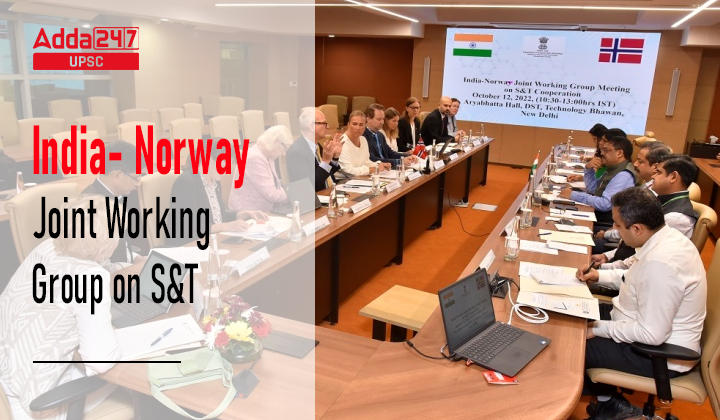Table of Contents
India- Norway Joint Working Group on S&T- Relevance for UPSC Exam
- GS Paper 2: International Relation- Bilateral, regional and global groupings and agreements involving India and/or affecting India’s interests.
India- Norway Joint Working Group on S&T in News
- Recently, India-Norway Joint Working Group on S&T discussed the extension of S&T co-operation to new areas between the two countries.
- Ms Anne Line Wold, Director General, Ministry of Education and research who headed the delegation from the Norway side underlined that India is among the 9 priority countries outside Europe in S&T co-operation for Norway.
- He further emphasized on strengthening co-operation on priority areas like ocean, health, energy, climate and security.
India- Norway Joint Working Group on S&T
- About: The Indo-Norwegian S&T Cooperation was formalized through an Inter-governmental agreement signed in Tromso, Norway in 2006 and was activated through a Programme of Cooperation (POC) signed in Oslo in May 2009.
- Functioning: A Joint Working Group constituted under the framework of Inter-Governmental agreement met for 6 times so far, alternately in India and Norway.
- Participation: The representatives from the Scientific and Education Ministries as well as the Ministry of External Affairs of India and their counterparts from Norway participated in the India- Norway Joint Working Group on S&T.
- Significance: India- Norway Joint Working Group on S&T meeting would expand to the areas of increasing relevance like green hydrogen, anti-microbial resistance, renewable energy and so on.
Key Outcome of India- Norway Joint Working Group on S&T
- Expansion of S&T co-operation between the two countries to include areas like
- Quantum science and technology,
- Electric mobility,
- Green hydrogen,
- Ocean science,
- Cyber-physical system,
- Blue economy,
- Information and communication technology
- Strengthening existing areas of co-operation like-
- Polar sciences,
- Bio-economy,
- Renewable energy,
- Nano-science and technology and
- Anti-microbial resistance
- The meeting decided on furthering activities like-
- Bilateral workshops,
- Support for on-going joint research projects,
- New joint R & D Project call with industry participation,
- Human capacity development,
- Focusing on areas which has more relevance or impact to society as well as industrial R & D programmes
Importance of India- Norway Joint Working Group on S&T
The co-operation will help in-
- Enhancing quality and relevance of R&D,
- Technology translation,
- Taking it to market,
- Connecting industry, Startups, MSMEs to R&D Labs and academia,
- Societal connect,
- Science for people,
- Diversity and inclusion (Youth, Women, Rural, SC/ST),
- Aligning S & T with national priorities, water, energy, environment, transport, health, manufacturing, waste processing and so on.
About Nordic Countries
- About: The Nordic Countries are a group of five countries in northern Europe. These five Nordic countries are Denmark, Sweden, Norway, Finland, and Iceland.
- Political System: Denmark, Sweden, and Norway are constitutional monarchies and parliamentary democracies. Finland and Iceland are democratic republics.
- Iceland’s parliament, the Althing, is the oldest parliament in the world.
- Population: Sweden is the largest and most populous of the Nordic countries. Iceland is the least populous. Denmark is the smallest.
- Economic strength: Nordic countries collectively represent an economy of more than $1.6 trillion.
- India-Nordic Countries Trade Balance: Total bilateral trade in goods and services between India and the Nordic countries is $13 billion.




 TSPSC Group 1 Question Paper 2024, Downl...
TSPSC Group 1 Question Paper 2024, Downl...
 TSPSC Group 1 Answer key 2024 Out, Downl...
TSPSC Group 1 Answer key 2024 Out, Downl...
 UPSC Prelims 2024 Question Paper, Downlo...
UPSC Prelims 2024 Question Paper, Downlo...




